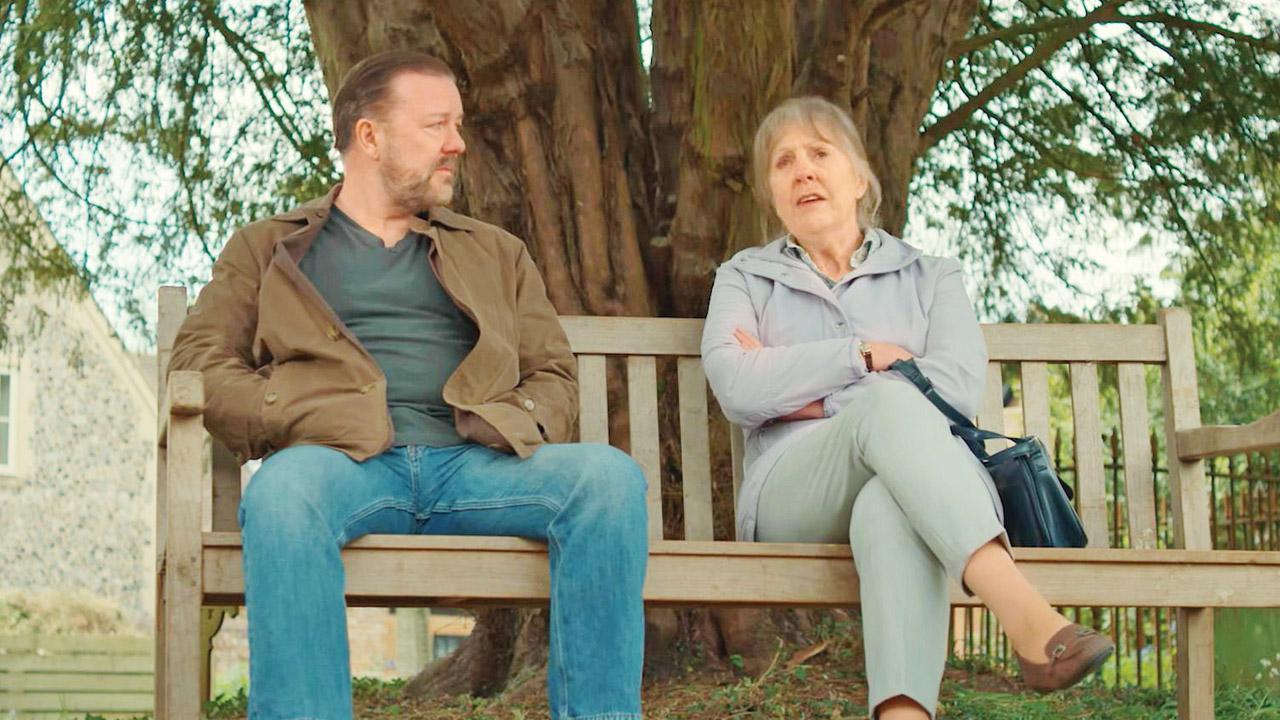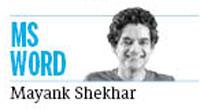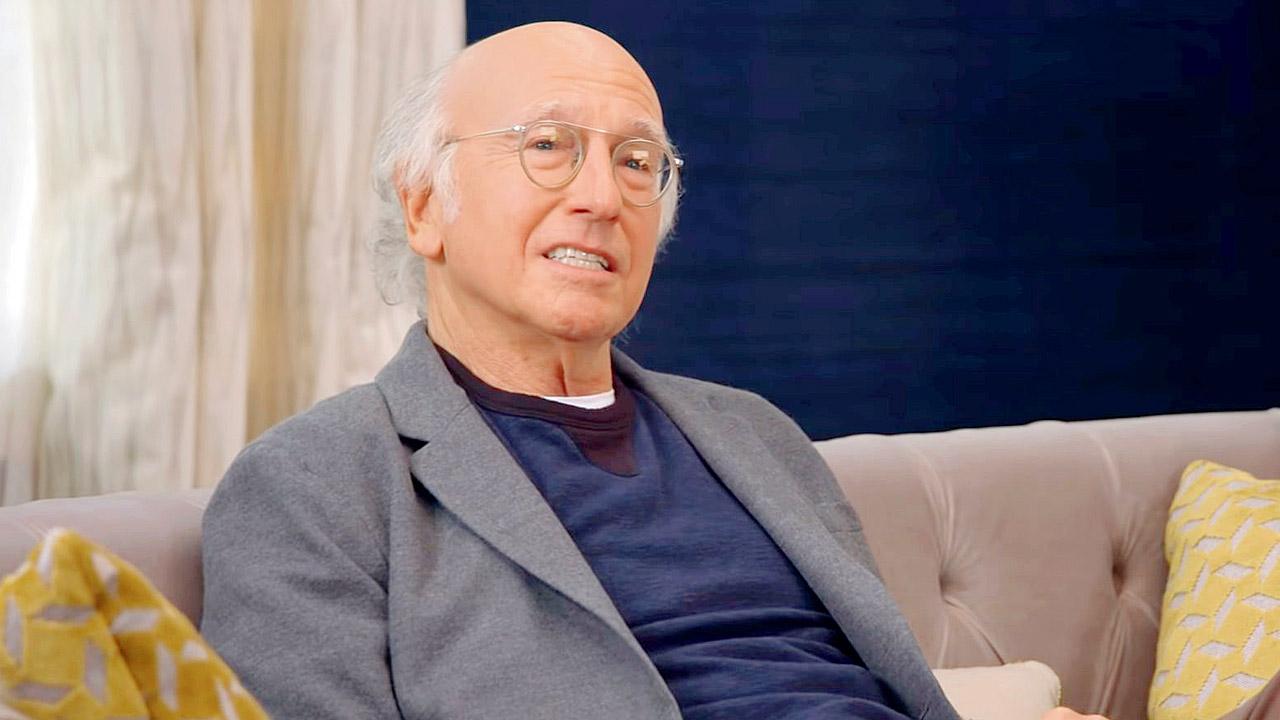What’s it about a Ricky Gervais TV show on loneliness that draws us to it, and ourselves?

A still from After Life
 It never occurred to me until my American born, 12-year-old niece wondered why I say the word “cheers” so often, and that I do. Until I find star-comedian Ricky Gervais doing the same on screen, probably after every sentence.
It never occurred to me until my American born, 12-year-old niece wondered why I say the word “cheers” so often, and that I do. Until I find star-comedian Ricky Gervais doing the same on screen, probably after every sentence.
ADVERTISEMENT
Assuming then it’s a British thing. And Bombay/desi English, in any case, is mostly a mix of British, American, and wherever else that you can make a bhel puri from.
Still glad that while Indians, on occasion, will type “Hiya!” (for hello) in phone text/chats, they never use that hyena-like British sound when actually talking. Although the commonest Brit slang that gets my goat has to be “bird”, for a woman, that Gervais (pronounced, Dj-er-vais) and his personal acting troupe say a lot too.
What mildly gets provocateur Gervais’s goat is when white, over-aged, single brats on the hunt at the bar refer to “banging some beavers” for casual sex. Yikes!
I’m of course making random observations from After Life–Gervais’s first series ever to get to a third, and perhaps final, season (on Netflix)—which, in turn, loads up equally on the similarly mundane.

Larry David playing Larry David in Curb Your Enthusiasm
What kinda show is After Life? Don’t know if Netflix always had this category separately listed on their homepage—apart from Comedies, Thriller, Horror, etc—I see it now, called ‘Casual Viewing’. As if everything else, they reckon, must feel like sitting for a board exam.
But ‘casual viewing’ fits just right for a comfort series that involves few locations, mostly neighbourhood/indoors, and characters that feel like friends—all of them middle of the rung to borderline losers; no faux heroes/villains. Circumstances largely inspiring their moves/moods/motivations. No huge stakes, by way of life or death, unlike a murder mystery, and other hoppity, dark sides of the moon.
The worst thing that’s likely to happen on such a show is heartbreak. They are, by far, the most watched on earth—usually sit-coms, or situational comedies, of shorter episodes, and longer shelf-lives.
Friends probably tops the list. Seinfeld comes close, surely. For a more adult population, perhaps The Office, originally co-written, directed, and enacted by Gervais, is right up there. And Schitt’s Creek might well be current No. 1. These aren’t shows you get a drink with—but watch along, because you’re already drunk, and it doesn’t matter.
The long-time favourite has been Curb Your Enthusiasm, with Seinfeld creator Larry David, playing Larry David. Among the greatest existential crises that the show dealt with, according to me, is how long you should hold the door for the stranger behind you—at a public place; ideally measured by the exact distance—to pass the test of social etiquette.
Also, how many tastings must a customer attempt at Baskin Robbins, before they give way to the line they’re on top of? Likewise, the bit where Larry points out what all men, seated in jeans/trousers have suffered, over generations—that misleading bulge in the crotch area, which is anything but what it annoyingly appears to be.
Gervais’s series Extras, by his admission, was influenced by Curb Your Enthusiasm. But, of course, so is After Life. The crabby old man Larry, taking the piss out of everyone, is to Curb what Gervais as Tony is to After Life, after all.
The Indian show Decoupled (on Netflix) comes close. Only the lead (Madhavan) there is a Type-A, smug, bestselling author variety, getting it on. His observations as humour are singularly directed at everyone else. Unlike the casually vulnerable, so not-hero types, partly annoying and adorably eccentric Larry, or Tony.
The jokes are on the lead character first. The self-absorbed, self-centred Tony, who’s strangely not a selfish man at all. Through him, you start to like those around, making After Life an even better series, when it’s not about the lead.
Particularly missed the Indian-origin girl (Mandeep Dhillon) in the third season of this all-white show who disappeared without explanation while she loved the small-town community newspaper job so much. Speaking of which, I’d love to own a neighbourhood paper like Tambury Gazette—just saying; not that anyone’s sponsoring.
My favourite character in After Life though has got to be the good-natured nurse Emma (Ashley Jensen), and the relationship she could share with Tony, since he’s determinedly emotionally unavailable. They label it “platonic love”, but it’s really the co-traveller’s precious companionship.
“We like each other, why do we need to call it something—we carry on the same way, nothing changes,” he says. “Maybe I don’t want Groundhog Day,” she replies, seeing only an unknown future with him, rather than pleasures of the present. They do become friends, in a real sense, I hope/suspect.
Besides suicidal thoughts, stages of grief from loss of the loved one add melancholy into the mix of the mundane. Or even kindness of strangers, and love from unexpected corners, at the other end—After Life is essentially a show about loneliness.
A phase that, I guess, can turn into a state of mind so strong that you may actively miss it if it’s taken away under circumstances that appear worse/hectic in comparison. Forced solitude over the pandemic may have compelled many to rethink all this. The three seasons of After Life did just that. And, say what, it’s gotta be listed as ‘Casual Viewing’ on Netflix!
Mayank Shekhar attempts to make sense of mass culture. He tweets @mayankw14
Send your feedback to mailbag@mid-day.com
The views expressed in this column are the individual’s and don’t represent those of the paper.
 Subscribe today by clicking the link and stay updated with the latest news!" Click here!
Subscribe today by clicking the link and stay updated with the latest news!" Click here!







